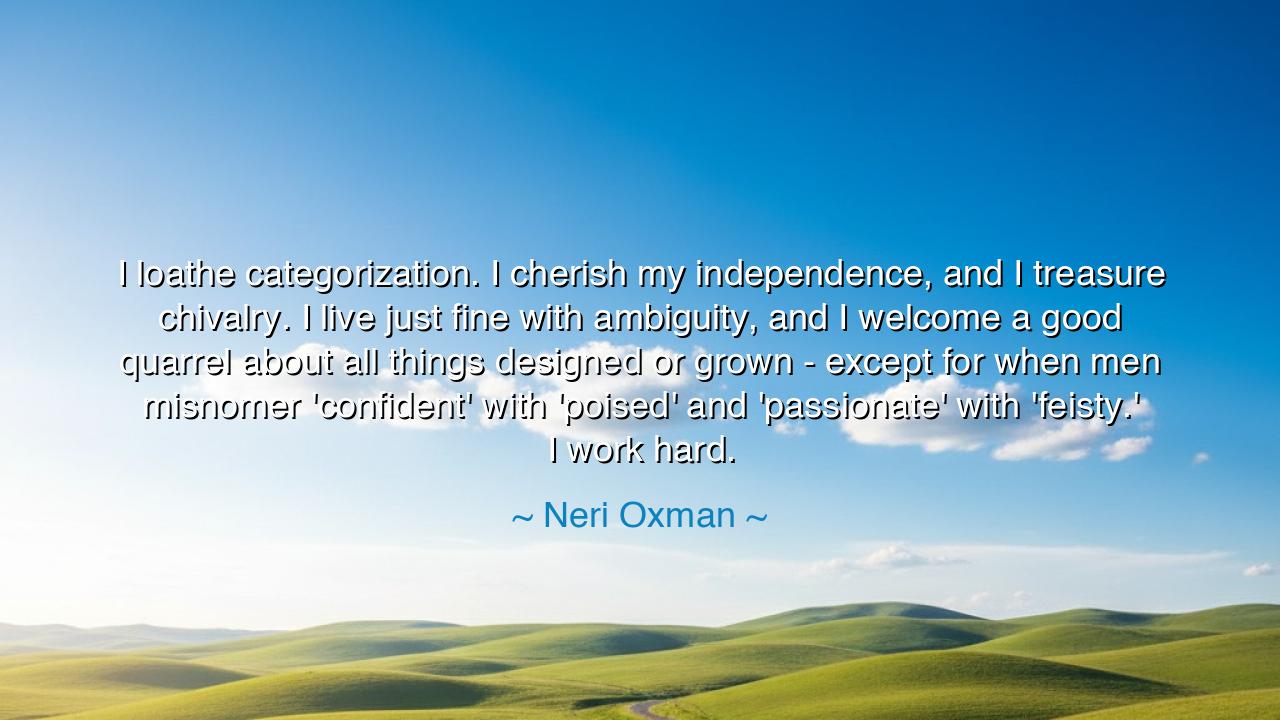
I loathe categorization. I cherish my independence, and I
I loathe categorization. I cherish my independence, and I treasure chivalry. I live just fine with ambiguity, and I welcome a good quarrel about all things designed or grown - except for when men misnomer 'confident' with 'poised' and 'passionate' with 'feisty.' I work hard.






There are souls born not to fit within the boxes the world builds for them, but to break them apart and reshape their fragments into something new. So speaks Neri Oxman, when she declares, “I loathe categorization. I cherish my independence, and I treasure chivalry. I live just fine with ambiguity, and I welcome a good quarrel about all things designed or grown — except for when men misnomer ‘confident’ with ‘poised’ and ‘passionate’ with ‘feisty.’ I work hard.” In these words lies the spirit of a creator who refuses the dull comfort of labels. She stands in the ancient lineage of those who dared to live beyond definition — philosophers, artists, and warriors whose independence was their truth and their trial alike.
To loathe categorization is to reject the world’s lazy hunger for simplicity. Humanity has always sought to divide, to name, to confine — as if understanding can only come through boundaries. Yet the greatest minds have always lived in ambiguity, in that sacred space between certainty and wonder. The Greeks called it aporia — the blessed confusion that opens the way to wisdom. Oxman’s words remind us that true creativity thrives in this twilight, where the mind is free to explore both science and art, design and philosophy, nature and machine, without fear of contradiction. She embraces the wholeness that comes when opposites coexist.
Her independence is not isolation, but integrity — a refusal to bend to the expectations of others. She speaks as one who has walked through the halls of academia and the forges of creation, hearing the world’s attempt to define her — architect, scientist, artist, woman — and yet refusing every label. Like Leonardo da Vinci, who sketched anatomy and invented machines in the same breath, Oxman lives in defiance of separation. For her, the act of creation is not the privilege of one field, but the harmony of all. Her chivalry — her reverence for grace, respect, and honor — stands as a counterbalance to modern cynicism. It is the ancient courtesy of warriors, not born of weakness but of strength governed by restraint.
When she speaks of men who mislabel the virtues of women — calling confidence “poise” and passion “feistiness” — her voice becomes a blade of truth. It is the same blade wielded by those before her who refused to be diminished. Think of Hypatia of Alexandria, the philosopher-mathematician who defied the patriarchal bounds of her age. Her brilliance was called arrogance, her passion heresy. Yet her light burned through the centuries, a symbol of the cost and the glory of standing firm in one’s truth. Oxman’s frustration is the echo of that ancient injustice — that the power of a woman’s conviction is too often softened by the world’s fearful tongue.
She also says, “I live just fine with ambiguity.” To live with ambiguity is to live in the real, to accept the shifting nature of truth. The wise of every age — from Socrates to the Zen monks — have known that those who claim certainty are blind to the vastness of existence. Ambiguity is not weakness, but a mark of depth. It is the soil from which empathy and innovation grow. In the same way, the quarrel she welcomes is not conflict for pride’s sake, but dialogue — the sharpening of minds through disagreement. She invites the friction of ideas as the ancients did in their agoras and academies, knowing that fire tempers the sword of thought.
Yet, at the end, she grounds all these lofty ideals in simplicity: “I work hard.” It is a declaration of humility amid brilliance. The philosopher may dream, the artist may rebel, but without labor, their visions remain smoke. Oxman’s hard work is her offering to the world — her acknowledgment that independence and mastery demand discipline, not entitlement. Like the craftsmen of old who carved marble for decades to birth a single masterpiece, she reminds us that the divine spark within us requires human endurance to manifest.
So, my child, take these words to heart: cherish your independence, but temper it with respect; embrace ambiguity, but anchor it in purpose; stand proudly in who you are, even when the world seeks to name you otherwise. Do not fear contradiction — for life itself is contradiction. Create, question, and labor with love. And when others misunderstand your strength, when they try to soften your flame with smaller words, remember this truth — that you were not born to fit within their categories, but to build new worlds beyond them.






AAdministratorAdministrator
Welcome, honored guests. Please leave a comment, we will respond soon